How Many Miles Will A Toyota 4runner Last? The Toyota 4Runner, renowned for its ruggedness and dependability, can last for 250,000 to 300,000 miles or more with proper care, making it a wise choice for drivers in Boise looking for a reliable SUV; visit millertoyota.net to explore our wide selection of 4Runners and experience the legendary Toyota quality for yourself. Regular maintenance, timely repairs, and careful driving habits are critical to maximizing the lifespan of your 4Runner, ensuring years of dependable performance and adventure; consider options like certified pre-owned vehicles and explore our financing options to make your dream 4Runner a reality.
1. Understanding the Longevity of Toyota 4Runner
How long can you realistically expect a Toyota 4Runner to last? The Toyota 4Runner is known for its exceptional durability, with many owners reporting their vehicles exceeding 250,000 to 300,000 miles with proper care. This longevity stems from Toyota’s commitment to quality engineering, robust construction, and the 4Runner’s design as a body-on-frame SUV, which enhances its resilience on and off-road. For drivers in Boise, Idaho, this means a 4Runner can be a long-term investment, providing reliable transportation for many years.
1.1. Factors Influencing the Lifespan of a 4Runner
What factors determine how long a Toyota 4Runner will last? Several factors influence the lifespan of a Toyota 4Runner, including maintenance, driving habits, environmental conditions, and the quality of replacement parts.
- Regular Maintenance: Consistent oil changes, fluid checks, and timely servicing of critical components such as the engine, transmission, and brakes are essential.
- Driving Habits: Gentle driving habits, avoiding harsh acceleration, and minimizing off-road abuse can significantly extend the vehicle’s life.
- Environmental Conditions: Exposure to extreme weather, road salt, and harsh terrains can accelerate wear and tear, requiring more frequent maintenance.
- Quality of Parts: Using genuine Toyota parts or high-quality aftermarket components ensures optimal performance and durability, reducing the risk of premature failures.
- Model Year: According to vehicle longevity studies conducted in 2023, newer 4Runner models tend to benefit from technological advancements and design improvements, potentially offering increased reliability compared to older versions.
1.2. Real-World Examples of 4Runner Longevity
Are there documented cases of 4Runners lasting an exceptionally long time? Absolutely. There are numerous documented cases of Toyota 4Runners exceeding 300,000, 400,000, and even 500,000 miles. These high-mileage vehicles often become symbols of the 4Runner’s legendary durability.
- Online Forums: Toyota 4Runner forums and online communities are filled with stories of owners who have reached impressive mileage milestones with their vehicles, often sharing maintenance tips and experiences.
- Automotive Blogs: Automotive blogs and websites frequently feature articles and interviews with 4Runner owners who have achieved exceptionally high mileage, highlighting the vehicle’s reliability.
- Social Media: Social media platforms showcase 4Runner owners proudly displaying their odometers, proving the vehicle’s longevity.
- Miller Toyota Testimonials: At millertoyota.net, you can find testimonials from our satisfied customers in Boise who have experienced the long-lasting reliability of their 4Runners firsthand.
 Toyota 4Runner instrument panel displaying high mileage
Toyota 4Runner instrument panel displaying high mileage
1.3. Comparing 4Runner Longevity to Other SUVs
How does the 4Runner’s lifespan compare to other SUVs in its class? The Toyota 4Runner consistently outperforms many of its competitors in terms of longevity, making it a standout choice for drivers prioritizing reliability. According to a 2024 study by iSeeCars, the Toyota 4Runner has a significantly higher percentage of vehicles reaching 200,000 miles compared to the average SUV.
| SUV Model | Percentage Reaching 200,000 Miles |
|---|---|
| Toyota 4Runner | 2.5% |
| Toyota Sequoia | 1.7% |
| Chevrolet Suburban | 1.5% |
| Ford Expedition | 1.1% |
| GMC Yukon XL | 1.0% |
| Average for All SUVs | 0.8% |
2. Essential Maintenance Practices for a Long-Lasting 4Runner
What maintenance steps are crucial for extending the life of a Toyota 4Runner? Following a consistent and comprehensive maintenance schedule is essential for maximizing the lifespan of your Toyota 4Runner.
2.1. Regular Oil Changes
Why are regular oil changes so important for a 4Runner’s engine? Regular oil changes are critical for keeping the engine of your Toyota 4Runner running smoothly and efficiently. Oil lubricates the engine’s moving parts, reducing friction and preventing wear. Over time, oil breaks down and becomes contaminated with dirt and debris, losing its ability to protect the engine.
- Recommended Interval: Toyota recommends changing the oil every 5,000 to 10,000 miles, depending on driving conditions and the type of oil used. Check your owner’s manual for specific recommendations.
- Benefits: Regular oil changes can extend engine life, improve fuel economy, and prevent costly repairs.
- Miller Toyota Service: At millertoyota.net, our expert technicians provide comprehensive oil change services, using high-quality oil and filters to keep your 4Runner in top condition.
2.2. Fluid Checks and Replacements
What other fluids need regular attention in a 4Runner? In addition to oil, several other fluids are essential for the proper functioning of your Toyota 4Runner.
- Coolant: Coolant prevents the engine from overheating and protects against corrosion. It should be checked regularly and flushed every 30,000 miles or as recommended in your owner’s manual.
- Transmission Fluid: Transmission fluid lubricates the transmission’s internal components, ensuring smooth shifting. It should be checked and replaced every 60,000 to 100,000 miles, depending on driving conditions.
- Brake Fluid: Brake fluid is critical for the proper functioning of the braking system. It should be checked regularly and flushed every two to three years to prevent moisture buildup and corrosion.
- Power Steering Fluid: Power steering fluid ensures smooth and effortless steering. It should be checked regularly and topped off as needed.
- Differential Fluid: Differential fluid lubricates the gears in the front and rear differentials, which are essential for off-road performance. It should be checked and replaced every 30,000 to 60,000 miles, depending on driving conditions.
2.3. Tire Maintenance and Rotation
How can proper tire care extend the life of a 4Runner? Proper tire maintenance is crucial for ensuring safe handling, optimal fuel economy, and extended tire life on your Toyota 4Runner.
- Regular Rotation: Rotating your tires every 5,000 to 8,000 miles helps ensure even wear, maximizing their lifespan.
- Proper Inflation: Maintaining the correct tire pressure, as specified in your owner’s manual or on the tire placard, is essential for optimal performance and fuel economy.
- Alignment: Regular wheel alignments prevent uneven tire wear and ensure proper handling.
- Tire Inspection: Regularly inspect your tires for signs of wear, damage, or embedded objects.
- Miller Toyota Tire Center: Visit millertoyota.net for expert tire services, including rotation, balancing, alignment, and tire replacement, to keep your 4Runner rolling smoothly.
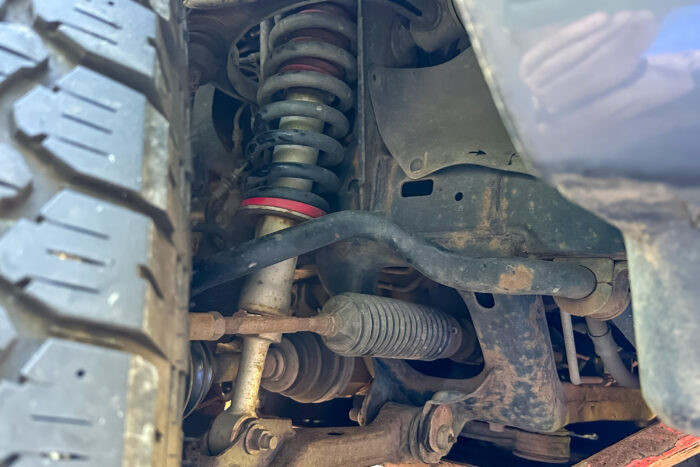 Toyota 4Runner tire being rotated
Toyota 4Runner tire being rotated
2.4. Brake System Servicing
What does brake system maintenance involve for a 4Runner? The brake system is critical for your safety, so regular servicing is essential.
- Pad and Rotor Inspection: Regularly inspect brake pads and rotors for wear and damage. Replace them as needed to ensure optimal braking performance.
- Fluid Flushes: Brake fluid should be flushed every two to three years to prevent moisture buildup and corrosion, which can compromise braking performance.
- Caliper Maintenance: Calipers should be inspected and lubricated to ensure they are functioning properly.
- Miller Toyota Brake Services: At millertoyota.net, our certified technicians offer comprehensive brake services, including inspections, pad replacements, rotor resurfacing, and fluid flushes, to keep your 4Runner stopping safely.
2.5. Addressing Rust and Corrosion
How can I protect my 4Runner from rust, especially in Boise’s climate? Rust and corrosion can significantly shorten the lifespan of any vehicle, especially in areas with harsh winters and road salt.
- Regular Washing: Wash your 4Runner regularly, especially during the winter months, to remove salt and grime that can promote rust.
- Undercoating: Consider applying an undercoating to protect the undercarriage from rust and corrosion.
- Touch-Up Paint: Repair any chips or scratches in the paint promptly to prevent rust from spreading.
- Rustproofing Services: Some auto shops offer rustproofing services that can provide additional protection.
- Miller Toyota Body Shop: Our body shop at millertoyota.net offers expert rust repair and prevention services to keep your 4Runner looking its best and lasting longer.
3. Smart Driving Habits to Prolong 4Runner Life
How can my driving style affect the lifespan of my 4Runner? Your driving habits play a significant role in the lifespan of your Toyota 4Runner. Practicing smooth, controlled driving can minimize wear and tear on critical components.
3.1. Smooth Acceleration and Braking
Why is gentle driving better for a 4Runner in the long run? Avoiding harsh acceleration and sudden braking can reduce stress on the engine, transmission, and brakes, extending their lifespan.
- Gradual Acceleration: Accelerate smoothly and gradually, rather than flooring the gas pedal.
- Anticipate Stops: Anticipate stops and slow down gradually, rather than slamming on the brakes.
- Maintain Safe Distance: Maintain a safe following distance to avoid sudden braking.
- Cruise Control: Use cruise control on highways to maintain a consistent speed and reduce strain on the engine.
3.2. Avoiding Overloading and Towing Beyond Capacity
What are the risks of overloading or exceeding towing limits with a 4Runner? Overloading your Toyota 4Runner or towing beyond its specified capacity can put excessive strain on the engine, transmission, suspension, and brakes, potentially leading to premature failures.
- Check Specifications: Consult your owner’s manual for the maximum payload and towing capacity of your 4Runner.
- Distribute Weight: Distribute weight evenly when loading cargo to maintain stability and prevent overloading individual components.
- Use Proper Equipment: Use appropriate towing equipment, such as a properly rated hitch and trailer brakes, when towing.
- Professional Advice: Seek professional advice from Miller Toyota’s service department to ensure safe towing practices.
3.3. Minimizing Off-Road Abuse
How can I enjoy off-roading without damaging my 4Runner? While the Toyota 4Runner is designed for off-road adventures, excessive or reckless off-roading can accelerate wear and tear on the suspension, drivetrain, and undercarriage.
- Choose Appropriate Trails: Select trails that are appropriate for your vehicle’s capabilities and your skill level.
- Avoid Extreme Obstacles: Avoid attempting extreme obstacles that could damage your vehicle.
- Proper Gear Selection: Use the appropriate gear selection for the terrain to minimize strain on the transmission.
- Regular Inspections: Inspect your vehicle after off-road trips for any signs of damage, such as bent suspension components or damaged undercarriage protection.
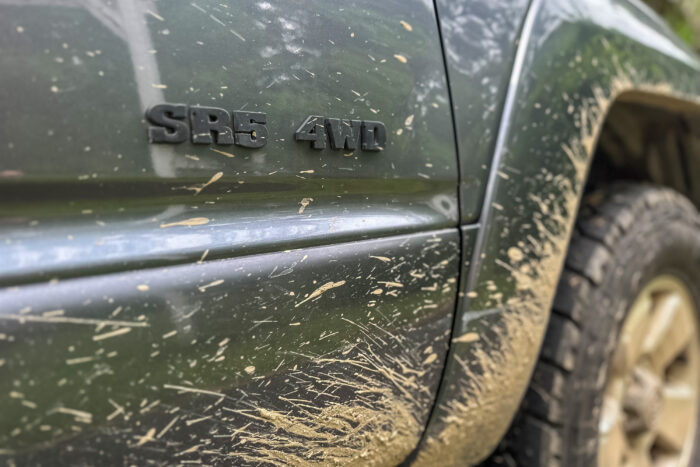 Toyota 4Runner driving on a moderate off-road trail
Toyota 4Runner driving on a moderate off-road trail
3.4. Addressing Minor Issues Promptly
Why is it important to fix small problems on a 4Runner right away? Addressing minor issues promptly can prevent them from escalating into more significant and costly problems.
- Check Engine Light: Investigate any warning lights immediately to identify and resolve the underlying issue.
- Unusual Noises: Pay attention to any unusual noises, such as squeaks, rattles, or vibrations, and have them checked by a mechanic.
- Fluid Leaks: Address any fluid leaks promptly to prevent damage to critical components.
- Miller Toyota Service Department: Our experienced technicians at millertoyota.net can diagnose and repair any issues with your 4Runner, helping you avoid costly breakdowns.
4. Choosing the Right Parts and Fluids for Your 4Runner
Does the quality of replacement parts affect a 4Runner’s longevity? Using high-quality parts and fluids is essential for ensuring the longevity and reliability of your Toyota 4Runner.
4.1. OEM vs. Aftermarket Parts
What are the pros and cons of using genuine Toyota parts versus aftermarket parts? When it comes to replacement parts, you have two main options: Original Equipment Manufacturer (OEM) parts and aftermarket parts.
- OEM Parts: OEM parts are manufactured by Toyota and are designed to meet the exact specifications of your vehicle. They offer guaranteed fit and performance but tend to be more expensive.
- Aftermarket Parts: Aftermarket parts are manufactured by third-party companies and can vary widely in quality. Some aftermarket parts offer comparable performance to OEM parts at a lower price, while others may be of inferior quality.
- Miller Toyota Parts Department: Our parts department at millertoyota.net offers a wide selection of genuine Toyota parts and accessories to keep your 4Runner running like new.
4.2. Selecting High-Quality Fluids
Why is it important to use the correct type of fluids in a 4Runner? Using the correct type of fluids is crucial for ensuring optimal performance and protection of your Toyota 4Runner’s components.
- Oil: Use the recommended oil type and viscosity, as specified in your owner’s manual. Synthetic oils generally offer better protection and longer service intervals.
- Coolant: Use Toyota Genuine Coolant or a compatible coolant that meets Toyota’s specifications.
- Transmission Fluid: Use Toyota Genuine ATF or a compatible automatic transmission fluid that meets Toyota’s specifications.
- Brake Fluid: Use DOT 3 or DOT 4 brake fluid, as specified in your owner’s manual.
- Miller Toyota Service Department: Our expert technicians at millertoyota.net use only high-quality fluids that meet Toyota’s specifications, ensuring optimal performance and protection for your 4Runner.
4.3. Researching Parts and Brands
How can I ensure I’m buying reliable parts for my 4Runner? Before purchasing replacement parts, it’s essential to do your research to ensure you’re getting a quality product.
- Read Reviews: Read online reviews and forums to get feedback from other 4Runner owners about specific parts and brands.
- Consult Mechanics: Consult with a trusted mechanic, such as those at Miller Toyota’s service department, for recommendations on reliable parts and brands.
- Check Warranties: Look for parts with warranties, which can provide peace of mind and protection against defects.
- Miller Toyota Parts Department: Our knowledgeable parts specialists at millertoyota.net can help you find the right parts for your 4Runner and ensure they meet Toyota’s quality standards.
5. Storage and Environmental Considerations for 4Runner Longevity
How does storage and the environment impact a 4Runner’s lifespan? Where and how you store your Toyota 4Runner and the environmental conditions it’s exposed to can significantly impact its lifespan.
5.1. Protecting Against Weather Elements
How can I shield my 4Runner from harsh weather conditions? Exposure to extreme weather conditions, such as intense sunlight, heat, cold, and moisture, can accelerate wear and tear on your Toyota 4Runner.
- Garage Parking: Park your 4Runner in a garage or carport whenever possible to protect it from the elements.
- Car Covers: Use a car cover to shield your vehicle from sunlight, rain, snow, and dust.
- Window Tinting: Apply window tinting to reduce heat buildup inside the vehicle and protect the interior from UV damage.
- Regular Washing and Waxing: Wash and wax your 4Runner regularly to protect the paint from the elements.
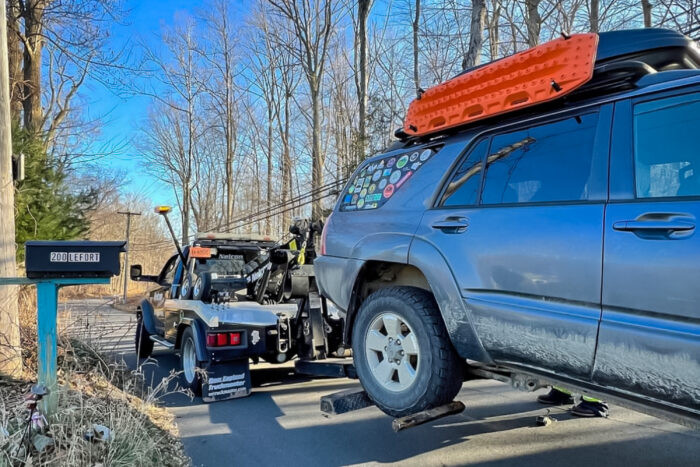 Toyota 4Runner parked in a garage
Toyota 4Runner parked in a garage
5.2. Long-Term Storage Tips
What steps should I take if I need to store my 4Runner for an extended period? If you need to store your Toyota 4Runner for an extended period, taking a few precautions can help prevent damage and ensure it’s ready to go when you need it.
- Clean the Vehicle: Wash and wax the exterior and clean the interior thoroughly to remove dirt and debris.
- Change the Oil and Filter: Change the oil and filter to remove any contaminants that could damage the engine during storage.
- Fill the Gas Tank: Fill the gas tank to prevent condensation and rust buildup. Add a fuel stabilizer to prevent the fuel from deteriorating.
- Protect the Tires: Inflate the tires to the recommended pressure and place the vehicle on jack stands to prevent flat spots.
- Disconnect the Battery: Disconnect the battery to prevent it from draining. Use a trickle charger to keep the battery charged during storage.
- Cover the Vehicle: Use a car cover to protect the vehicle from dust and moisture.
- Store in a Dry Place: Store the vehicle in a dry, well-ventilated area to prevent rust and mold growth.
5.3. Minimizing Exposure to Salt and Corrosion
How can I reduce the risk of corrosion on my 4Runner in areas with road salt? In areas with road salt, taking steps to minimize exposure to salt and corrosion is essential for preserving the lifespan of your Toyota 4Runner.
- Regular Washing: Wash your vehicle frequently, especially during the winter months, to remove salt and grime.
- Underbody Wash: Pay special attention to the underbody, where salt and grime tend to accumulate.
- Protective Coatings: Consider applying protective coatings to the undercarriage and other vulnerable areas.
- Touch-Up Paint: Repair any chips or scratches in the paint promptly to prevent rust from spreading.
6. Recognizing Warning Signs and Seeking Professional Help
When should I take my 4Runner to a mechanic, even if it seems like a minor issue? Recognizing warning signs and seeking professional help promptly can prevent minor issues from escalating into major problems, saving you time and money in the long run.
6.1. Unusual Noises or Vibrations
What do different sounds or vibrations indicate about a 4Runner’s health? Unusual noises or vibrations can be indicators of underlying problems in your Toyota 4Runner.
- Squealing Brakes: Squealing brakes may indicate worn brake pads or rotors.
- Knocking Engine: A knocking engine may indicate worn connecting rod bearings or other internal engine damage.
- Clunking Suspension: A clunking suspension may indicate worn ball joints, control arm bushings, or struts.
- Vibrating Steering Wheel: A vibrating steering wheel may indicate unbalanced tires, a bent wheel, or worn suspension components.
- Miller Toyota Service Department: Our experienced technicians at millertoyota.net can diagnose and repair any unusual noises or vibrations in your 4Runner, helping you avoid costly breakdowns.
6.2. Warning Lights and Gauges
What should I do if a warning light comes on in my 4Runner? Warning lights and gauges are designed to alert you to potential problems with your Toyota 4Runner.
- Check Engine Light: A check engine light can indicate a wide range of issues, from a loose gas cap to a serious engine problem. Have it checked by a mechanic as soon as possible.
- Oil Pressure Light: An oil pressure light indicates low oil pressure, which can cause serious engine damage. Stop the vehicle immediately and have it towed to a mechanic.
- Temperature Gauge: A temperature gauge that reads high indicates an overheating engine. Stop the vehicle immediately and allow it to cool down before checking the coolant level.
- Battery Light: A battery light indicates a problem with the charging system. Have it checked by a mechanic to prevent a dead battery.
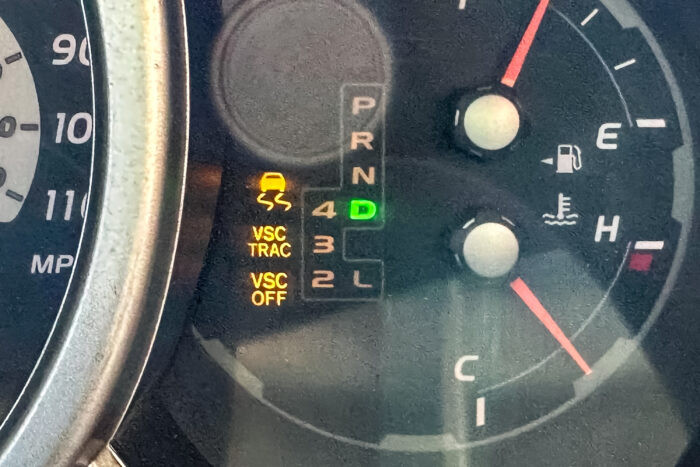 Toyota 4Runner dashboard with warning lights illuminated
Toyota 4Runner dashboard with warning lights illuminated
6.3. Scheduled Maintenance Overdue
Why is it risky to delay scheduled maintenance on a 4Runner? Delaying scheduled maintenance can lead to a cascade of problems, as neglected components can cause damage to other parts of the vehicle.
- Oil Changes: Delaying oil changes can cause sludge buildup, leading to reduced engine performance and premature wear.
- Fluid Flushes: Delaying fluid flushes can cause corrosion and contamination, leading to reduced performance and potential damage.
- Tire Rotations: Delaying tire rotations can cause uneven wear, reducing tire life and compromising handling.
- Miller Toyota Service Department: Our service advisors at millertoyota.net can help you stay on top of your 4Runner’s maintenance schedule, ensuring it stays in top condition for years to come.
6.4. Finding a Reliable Mechanic
How do I choose a trustworthy mechanic for my 4Runner in Boise? Finding a reliable mechanic is essential for ensuring your Toyota 4Runner receives the proper care and attention it needs.
- Ask for Recommendations: Ask friends, family, and online communities for recommendations on trusted mechanics in your area.
- Check Online Reviews: Read online reviews on websites like Yelp and Google to get feedback from other customers.
- Look for Certifications: Look for mechanics who are certified by the National Institute for Automotive Service Excellence (ASE).
- Visit Miller Toyota Service Department: Our certified technicians at millertoyota.net have the expertise and experience to service your 4Runner properly, using genuine Toyota parts and fluids.
7. The Role of Model Year and Trim in 4Runner Longevity
Do some 4Runner model years or trim levels tend to last longer than others? The model year and trim level of your Toyota 4Runner can influence its longevity due to variations in technology, features, and intended use.
7.1. Comparing Different Generations of 4Runner
How do the different generations of 4Runner compare in terms of reliability? The Toyota 4Runner has a long history of reliability, but some generations have proven to be more durable than others.
- 3rd Generation (1996-2002): Known for its simplicity and ruggedness, the 3rd generation 4Runner is a favorite among off-road enthusiasts.
- 4th Generation (2003-2009): The 4th generation 4Runner offered a more refined ride and updated features while maintaining its off-road capability.
- 5th Generation (2010-Present): The 5th generation 4Runner combines modern technology with traditional 4Runner toughness, making it a popular choice for both daily driving and off-road adventures.
- Miller Toyota Inventory: Explore our extensive inventory of new and used 4Runners at millertoyota.net to find the perfect model for your needs and budget.
7.2. Impact of Technology and Features
How do advanced features affect the long-term reliability of a 4Runner? While advanced technology and features can enhance the driving experience, they can also introduce potential points of failure.
- Complexity: More complex systems, such as electronic suspension and advanced infotainment systems, can be more prone to problems than simpler, more traditional systems.
- Maintenance: Advanced features may require specialized maintenance and repairs, which can be more expensive.
- Reliability: Toyota’s reputation for reliability helps mitigate some of the risks associated with advanced technology.
- Miller Toyota Service Department: Our certified technicians at millertoyota.net are trained to service and repair all of the advanced features in your 4Runner, ensuring it stays in top condition.
7.3. Trim Levels and Intended Use
Does the trim level of a 4Runner influence how long it will last? The trim level of your Toyota 4Runner can influence its longevity due to variations in intended use and equipment.
- SR5: The SR5 is the base trim level and is designed for everyday driving.
- TRD Off-Road: The TRD Off-Road is designed for off-road enthusiasts and includes features like a locking rear differential and crawl control.
- Limited: The Limited trim level offers a more luxurious experience with features like leather seats and a premium sound system.
- TRD Pro: The TRD Pro is the most off-road-capable trim level and includes features like upgraded suspension and skid plates.
- Miller Toyota Inventory: Our knowledgeable sales staff at millertoyota.net can help you choose the right trim level for your needs and ensure it’s properly equipped for your intended use.
8. Financial Implications of Maintaining a High-Mileage 4Runner
Is it financially wise to keep maintaining an older, high-mileage 4Runner? While the Toyota 4Runner is known for its longevity, there comes a point where the cost of maintaining an older, high-mileage vehicle may outweigh the benefits.
8.1. Cost of Repairs vs. Replacement
How do I decide whether to repair or replace my aging 4Runner? When faced with a major repair on an older 4Runner, it’s essential to weigh the cost of the repair against the cost of replacing the vehicle.
- Repair Costs: Get an estimate for the repair from a trusted mechanic, such as those at Miller Toyota’s service department.
- Vehicle Value: Determine the current market value of your 4Runner using online resources like Kelley Blue Book and Edmunds.
- Replacement Costs: Research the cost of a new or used vehicle that meets your needs.
- Rule of Thumb: A general rule of thumb is that if the cost of the repair exceeds 50% of the vehicle’s value, it may be time to consider replacing it.
8.2. Depreciation and Resale Value
How does mileage affect the resale value of a 4Runner? High mileage can significantly impact the resale value of a Toyota 4Runner.
- Mileage Thresholds: Vehicles with over 100,000 miles typically have a lower resale value than those with fewer miles.
- Condition: The overall condition of the vehicle, including its maintenance history and cosmetic appearance, also plays a role in its resale value.
- Miller Toyota Trade-In Program: Our trade-in program at millertoyota.net offers competitive prices for your used vehicle, making it easy to upgrade to a newer model.
8.3. Long-Term Cost Analysis
What factors should I consider when calculating the long-term cost of owning a 4Runner? When calculating the long-term cost of owning a Toyota 4Runner, it’s essential to consider all of the associated expenses.
- Purchase Price: The initial purchase price of the vehicle.
- Depreciation: The decline in value over time.
- Maintenance Costs: The cost of routine maintenance, such as oil changes, tire rotations, and fluid flushes.
- Repair Costs: The cost of unexpected repairs.
- Fuel Costs: The cost of gasoline or diesel.
- Insurance Costs: The cost of insurance premiums.
- Registration Fees: The cost of annual registration fees.
9. Extending 4Runner Life with Upgrades and Modifications
Can certain upgrades or modifications help extend the lifespan of a 4Runner? While proper maintenance and driving habits are critical for extending the lifespan of a Toyota 4Runner, certain upgrades and modifications can also help.
9.1. Suspension Upgrades for Off-Road Durability
How can upgrading the suspension improve a 4Runner’s off-road performance and longevity? Upgrading the suspension can improve a 4Runner’s off-road performance and durability, especially if you frequently drive on rough terrain.
- Lift Kits: Lift kits can increase ground clearance, allowing you to clear larger obstacles.
- Heavy-Duty Shocks: Heavy-duty shocks can improve ride quality and control, especially when driving off-road.
- Upgraded Springs: Upgraded springs can provide additional support and prevent sagging, especially when carrying heavy loads.
- Miller Toyota Accessories Department: Our accessories department at millertoyota.net offers a wide selection of suspension upgrades for your 4Runner, including lift kits, shocks, and springs.
9.2. Adding Protective Armor
What types of protective armor are available for a 4Runner, and how do they help? Adding protective armor can help protect your Toyota 4Runner from damage when driving off-road.
- Skid Plates: Skid plates protect the undercarriage from rocks and other obstacles.
- Rock Sliders: Rock sliders protect the rocker panels from damage when driving over rocks.
- Bumpers: Aftermarket bumpers can provide additional protection and improve approach and departure angles.
- Miller Toyota Accessories Department: Our accessories department at millertoyota.net offers a wide selection of protective armor for your 4Runner, including skid plates, rock sliders, and bumpers.
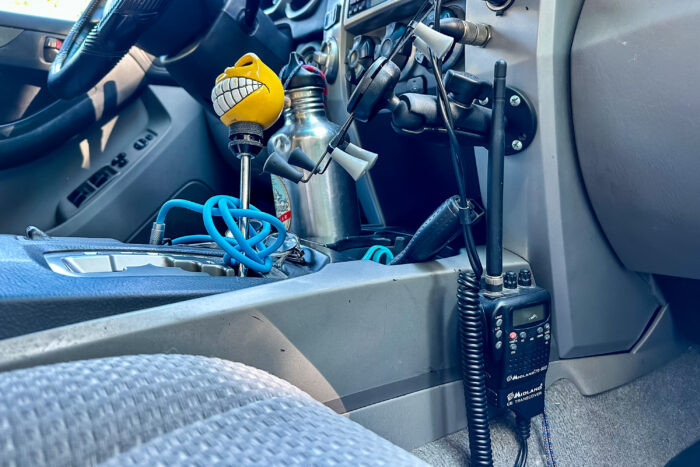 Toyota 4Runner with aftermarket bumpers and skid plates
Toyota 4Runner with aftermarket bumpers and skid plates
9.3. Performance Enhancements and Reliability
Can performance upgrades also improve a 4Runner’s reliability? While some performance upgrades can improve a Toyota 4Runner’s reliability, it’s essential to choose them carefully and ensure they are properly installed.
- Cold Air Intakes: Cold air intakes can improve engine performance and fuel economy, but they should be installed properly to avoid damaging the engine.
- Exhaust Systems: Aftermarket exhaust systems can improve engine performance and sound, but they should be designed to meet emissions standards.
- Tuning: Engine tuning can improve performance and fuel economy, but it should be done by a qualified professional.
- Miller Toyota Service Department: Our certified technicians at millertoyota.net can help you choose the right performance upgrades for your 4Runner and ensure they are properly installed.
10. Case Studies: High-Mileage 4Runner Success Stories
Are there any notable examples of 4Runners exceeding mileage expectations? Examining case studies of high-mileage Toyota 4Runners can provide valuable insights into the factors that contribute to their longevity.
10.1. Documented High-Mileage Examples
What are some of the highest mileage 4Runners on record? There are numerous documented cases of Toyota 4Runners exceeding 300,000, 400,000, and even 500,000 miles.
- Online Forums: Toyota 4Runner forums and online communities are filled with stories of owners who have reached impressive mileage milestones with their vehicles, often sharing maintenance tips and experiences.
- Automotive Blogs: Automotive blogs and websites frequently feature articles and interviews with 4Runner owners who have achieved exceptionally high mileage, highlighting the vehicle’s reliability.
- Social Media: Social media platforms showcase 4Runner owners proudly displaying their odometers, proving the vehicle’s longevity.
10.2. Key Factors in Their Longevity
What common practices do high-mileage 4Runner owners share? Analyzing the experiences of high-mileage Toyota 4Runner owners reveals several common practices that contribute to their vehicles’ longevity.
- Regular Maintenance: Consistent oil changes, fluid checks, and timely servicing of critical components.
- Gentle Driving Habits: Avoiding harsh acceleration, sudden braking, and off-road abuse.
- High-Quality Parts: Using genuine Toyota parts or high-quality aftermarket components.
- Prompt Repairs: Addressing minor issues promptly to prevent them from escalating into major problems.
- Proper Storage: Protecting the vehicle from the elements and storing it properly when not in use.
10.3. Lessons Learned and Best Practices
What are the most important takeaways from these high-mileage 4Runner stories? The stories of high-mileage Toyota 4Runner owners offer valuable lessons and best practices for extending the lifespan of your vehicle.
- Maintenance is Key: Regular maintenance is the most critical factor in ensuring a long-lasting 4Runner.
- Driving Habits Matter: Gentle driving habits can significantly reduce wear and tear on critical components.
- Quality Parts Pay Off: Using high-quality parts can prevent premature failures and costly repairs.
- Address Issues Promptly: Addressing minor issues promptly can prevent them from escalating into major problems.
- Protect Your Investment: Protecting your vehicle from the elements and storing it properly when not in use can help preserve its value and longevity.
By following these tips and best practices, you can maximize the lifespan of your Toyota 4Runner and enjoy years of reliable performance and adventure. Visit millertoyota.net to explore our wide selection of 4Runners and experience the legendary Toyota quality for yourself. Contact us today to schedule a test drive or service appointment. We are located at 208 N Maple Grove Rd, Boise, ID 83704, United States. You can reach us by phone at +1 (208) 376-8888 or visit our website at millertoyota.net.
FAQ: Toyota 4Runner Longevity
1. What is the average lifespan of a Toyota 4Runner?
With proper maintenance and care, a Toyota 4Runner can typically last between 250,000 to 300,000 miles or even more.
2. How often should I change the oil in my 4Runner?
Toyota recommends oil changes every 5,000 to 10,000 miles, depending on driving conditions and the type of oil used.
3. What type of fuel should I use in my 4Runner?
Consult your owner’s manual for the recommended fuel type. Most 4Runners can run on regular unleaded gasoline.
4. How often should I rotate the tires on my 4Runner?
Rotating your tires every 5,000 to 8,000 miles helps ensure even wear and extend their lifespan.
5. What are the most common problems with high-mileage 4Runners?
Common problems with high-mileage 4Runners include worn suspension components, rust and corrosion, and engine and transmission issues.
6. Can I extend the life of my 4Runner with aftermarket parts?
Yes, but choose high-quality parts from reputable brands to ensure optimal performance and reliability.
7. How important is it to follow the recommended maintenance schedule?
Following the recommended maintenance schedule is critical for extending the life of your 4Runner and preventing costly repairs.
8. What should I do if my check engine light comes on?
Have it checked by a qualified mechanic as soon as possible to diagnose and resolve the underlying issue.
9. Is it worth it to repair a high-mileage 4Runner?
Weigh the cost of the repair against the vehicle’s value and the cost of replacing it. If the repair costs exceed 50% of the vehicle’s value, it may be time to consider replacing it.
10. Where can I find a reliable mechanic for my 4Runner in Boise?
Visit Miller Toyota Service Department at millertoyota.net for expert service and repairs performed by certified technicians.
